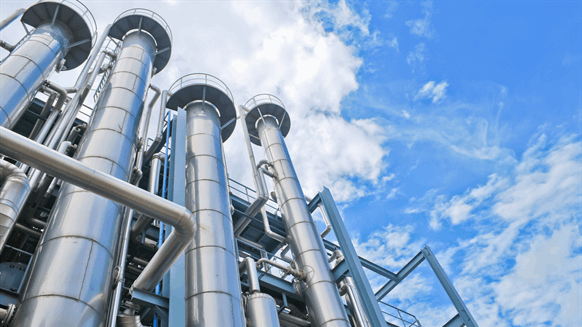Eni, Euglena, and Petronas will jointly study the possibility of developing and operating a biorefinery in the Pengerang Integrated Complex (PIC) in Malaysia.
The three parties are currently carrying out technical and economic feasibility assessments for the proposed project, with the investment decision expected to be reached by 2023 and the plant targeted to be completed by 2025.
To be located adjacent to Petronas’ existing integrated refinery and petrochemical facilities, the biorefinery will be able to leverage the company’s integrated value chain as well as existing utilities and facilities in PIC. The complex’s strategic location with easy access to major international shipping lanes will also enhance the planned refinery’s ability to cater for the rising demand for sustainable solutions worldwide.
The biorefinery is expected to have a flexible configuration to maximize the production of Sustainable Aviation Fuel (SAF) for aircraft as well as Hydrogenated Vegetable Oil (HVO) for on-road vehicles, diesel-powered trains, and marine transportation.
The biorefinery is also expected to have the capability to process about 650,000 tons per year of raw materials to produce up to 12,500 barrels per day of biofuels, namely SAF, HVO, and bio-naphtha. The planned biorefinery will use the Ecofining process which was developed by Eni in cooperation with Honeywell UOP.
“For the biorefinery project to develop together with Euglena and PETRONAS in Malaysia, Eni is pleased to share its experience and its breakthrough technologies that enabled the company to make the world’s first conversion of a refinery into a biorefinery in Porto Marghera in 2014, and to inaugurate a second one in Gela, Sicily, in 2019,” Giuseppe Ricci, COO for Energy Evolution at Eni, said.
HVO, of which Eni is the only Italian producer and the second in Europe, can be used either added to diesel fuel or in pure form in all approved engines – 100%-pure HVO enables CO2 emission reductions of 60% to 90% depending on the feedstock, compared to the standard fossil fuel mix. In addition, currently biofuels are also a real solution for decarbonizing the aviation sector. Eni Biojet is the SAF produced at Eni’s Livorno refinery, in cooperation with Eni’s Gela biorefinery. It is mixed 20% into Eni Jet Fuel, and from 2024, production of an additional 150 thousand tons per year of Eni Biojet will be started in Gela, able to meet the potential blending obligation of the Italian market for 2025.
Euglena is Japan’s biotechnology-driven and sustainability-oriented growth company. Euglena completed Japan’s first demonstration of plant-producing renewable jet and diesel fuels in 2018 and has supplied its products to corporates and organizations covering land, air, and marine areas across the country. Recently, Euglena became Japan’s first supplier that introduced domestic SAF to the hydrant system of Narita International Airport and completed Japan’s first supply of SAF to the governmental aircraft of Japan.
“This project is a significant step for the commercialization of our Biofuel business and our challenge to expediting biofuel usages and decarbonization in Japan. I am extremely excited for the opportunity to work with the great partners of respective expertise and stride together for a brighter and cleaner future,” founder and President of Euglena Mitsuru Izumo stated.
“As Petronas continues to chart its course into the biofuels space, decarbonizing, and diversifying its production portfolio to cater for the rising global demand for sustainable solutions, this collaboration is momentous to unlock the partners’ respective strengths and jointly strengthen our position in the field of biofuels in Malaysia and around the world,” said Ahmad Adly Alias, VP of Refining, Marketing, and Trading of Petronas’ Downstream business.
Reference: https://www.rigzone.com/news/eni_petronas_euglena_looking_to_build_biorefinery_in_malaysia-15-dec-2022-171397-article/?rss=true

